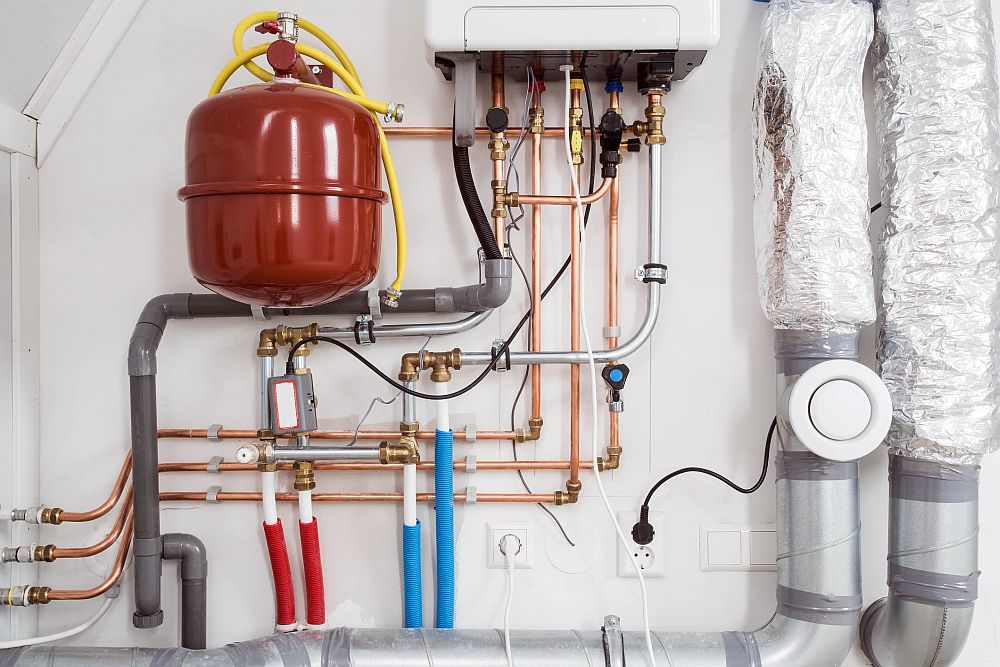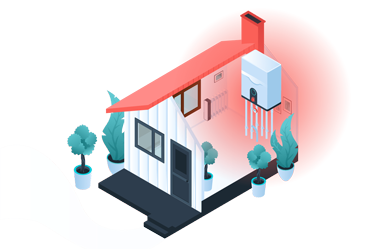Boiler Overheating? Here’s Why, and What You Can Do About It
Having problems with your boiler overheating and locking out when your hot water is on? No problem — our 5-minute guide will cover everything you need to know if your boiler keeps overheating and cutting out.

Should a Boiler Be Hot to Touch?
When your gas boiler is running, it’s perfectly normal for its casing to get warm. How warm a boiler gets depends on several factors. Smaller boilers tend to get a bit warmer than their larger counterparts, as do boilers that are installed in an enclosed space.
Note that most modern boilers should not get uncomfotably warm to the touch. So, your hand should never experience discomfort when you’re touching the boiler. So, if you feel high heat when your skin comes in contact with the casing, it’s becuase your boiler temperature is too high, i.e. your boiler is overheating.
Why Your Boiler Keeps Overheating and Cutting Out
When your boiler temperature is too high and the boiler cuts out when running hot water, you’re dealing with a boiler lockout. This is a standard safety feature that all manufacturers incorporate into their design.
Essentially, its purpose is to shut the boiler down when it’s unsafe to operate — like when a combi boiler has water temperature that’s too hot.
To get the boiler working again, you’ll have to first address the root problem, then reset the boiler.
What Causes a Boiler to Overheat
Below, we’ll go over common problems that may cause a boiler to overheat, and what you can do to fix an overheating boiler.
#1 – Removing Pressure Release Valves
Pressure release valves (PRVs) are important safety features that help the boiler vent excess pressure. When a boiler gets hot, it needs to relieve high pressure through the PRV.
However, pressure relief valves are known to leak. So, some (dodgy) engineers will remove or seal the PRV to stop the boiler leak, not realising that doing so can lead to a gas boiler overheating, and in the worst case, cause an explosion.
The Fix
If you’re noticing that the boiler is overheating and the boiler pressure is too high, the safest way to proceed is to leave your boiler off and get a Gas Safe engineer to come and inspect it. The heating engineer will examine the PRV (if there is one), and let you know if it needs a replacement or repairs. With a functioning PRV, the boiler should fire up and continue working without further issues.
#2 – Failed Thermistor
Thermistors work with the boiler’s heart — the Printed Circuit Board (PCB). The thermistors let the PCB know if the demand for temperature (and therefore, gas, oil, or LPG fuel) is more or less than the heat output the boiler is currently producing.
A faulty thermistor could lead the PCB to needlessly deliver more fuel than required, which would translate to the water getting very hot and the boiler overheating.
The Fix
To fix a possible thermistor issue, you should first confirm that something else isn’t behind your overheating boiler. So, call a Gas Safe registered engineer and have them look at your boiler’s electronics, including the thermistor and PCB. Hopefully, only the thermistor needs a replacement — the costs of getting a new PCB can be prohibitive.
#3 – Limescale on the Heat Exchanger
If you’ve read our guide to boiler noise, specifically, boilers making whistling and kettling noises, you’ll know that build up of limescale is a heat exchanger problem.
Limescale comes from mineral content in water, and mostly affects central heating systems in hard water areas. When it builds up on the heat exchanger, it creates hotspots, where water reaches a higher-than-normal, boiling temperature. These hotspots produce the whistling sound and cause the boiler’s internal components to overheat.
The Fix
With any luck, a heating engineer should be able to fluch your system and get rid of some of the limescale buildup. Hopefully it hasn’t accumulated on expensive components, such as the heat exchanger; if it has, and your boiler is out of warranty, it may be time to consider a boiler replacement. Note that it’s virtually impossible to remove ALL limescale from a central heating system.
#4 – Blockage in the System
A central heating system is susceptible to 2 types of blockages:
- Heating sludge blockages
- Condensate pipe blockages
Heating Sludge Blocking the Central Heating System
Central heating sludge is debris that comes from inside the pipes, valves, and radiators. Essentially, it’s dirty water with bits of rust in it.
When it clogs up a heating system, it can create back pressure, sometimes blowing the pump seals. If the PRV isn’t fully functional, this can lead to a boiler overheating and turning off.
Condensate Pipe Blockages
A condensate pipe helps your boiler discharge condensate to the outdoors; all modern, condensing boilers have this pipe.
If your boiler is overheating in the winter, or in the morning when it’s cold out, there’s a good chance you’re dealing with a frozen pipe.
And, if your boiler is overheating all year-round, there’s a good chance leaves and dirt have made their way into the pipe and clogged it.
The Fix
Getting rid of heating sludge is a bit easier than removing limescale, but the process still requires you to get a professional to power flush your system. You can attempt to do so yourself, but there’s a good chance you’ll end up calling a heating engineer for help at some point. You have to pay out of pocket, since even the most comprehensive boiler care plans do not cover debris-related damage.
If it’s the condensate pipe that’s frozen, you can easily thaw it out by pouring warm (not hot!) water over the pipe.
#5 – Pump Overheating
One problem that’s often overlooked when a boiler is overheating is the pump.
Pumps typically overheat for one reason — when they’ve seized. Pumps should be warm, as they are motorised, but not hot. If a pump is too hot to touch, there’s a good chance that internal components are seized.
The Fix
A gentle tap can sometimes free the seized components, but it doesn’t fully fix the pump fault. The pump needs to be taken apart, cleaned, and inspected.
What You Can Do to Keep Your Boiler From Overheating
The most common causes of a boiler overheating is limescale and sludge build up. Preventing boiler lockouts associated with these problems is simple:
- Hot flush your boiler to remove limescale and heating sludge
- Add central heating inhibitor to your heating system
- Install a scale reducer
- Install a magnetic system filter.
If your boiler overheats despite these preventative measures, check out our guide to top combi boiler problems here.
Prefer a boiler replacement? Get your on-screen price from Heatable in less than 2 minutes.
What’s Next?
Thanks to reading our guide to problems with a boiler overheating. Is there anything that we missed? Is your boiler overheating and you’re not sure why? Please leave us a comment below and we’ll get back to you as soon as we can.

Hi, I have Ariston Microgenus 23. Heating works fine,but hot water not. It heats up to maximum and cut off for 12 seconds and fire it up again for 12 seconds and again and again. Looks for me like overheating and after cool down and switch on again. What could be the reason?
It could be a pump problem. Tried diagnosing the pump?